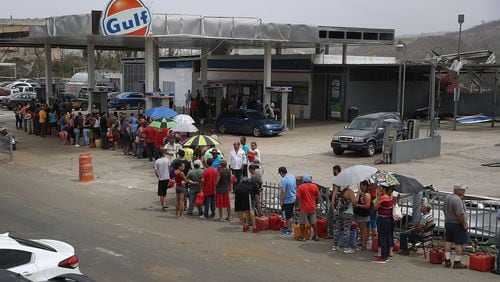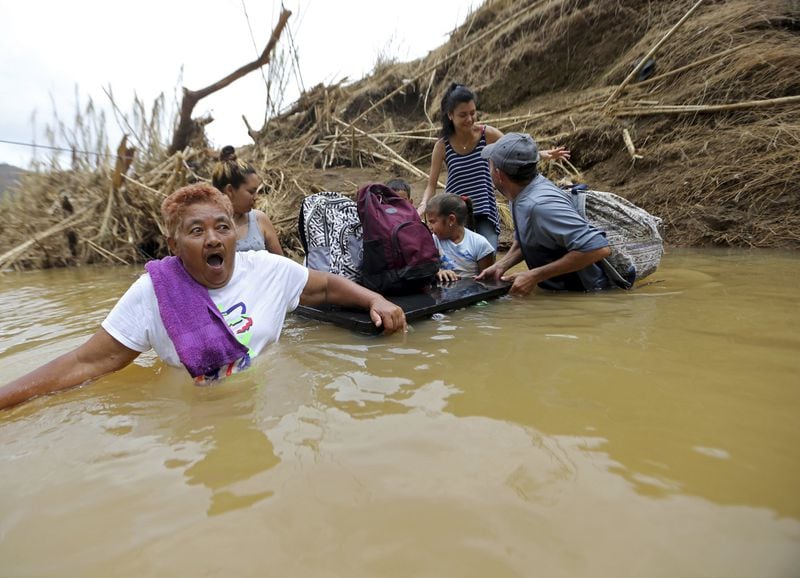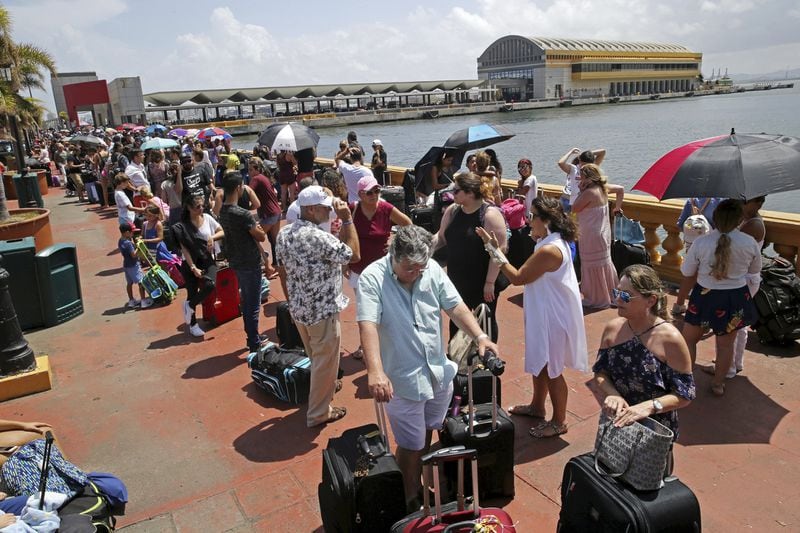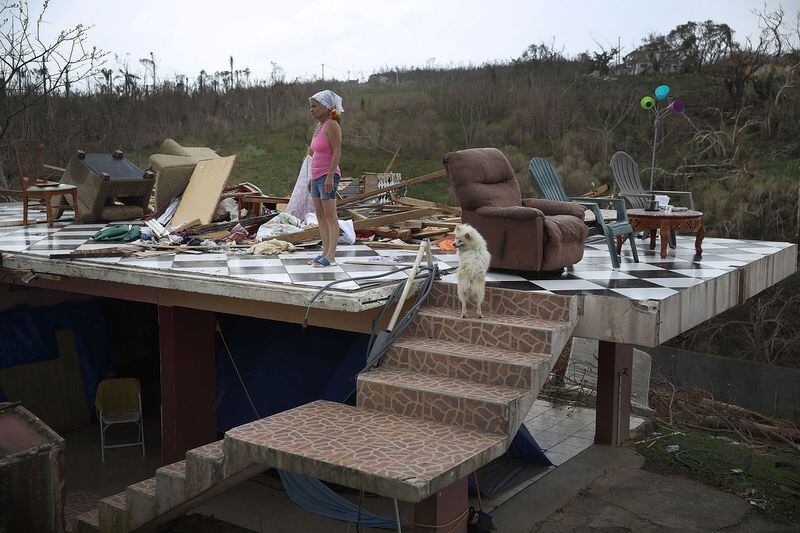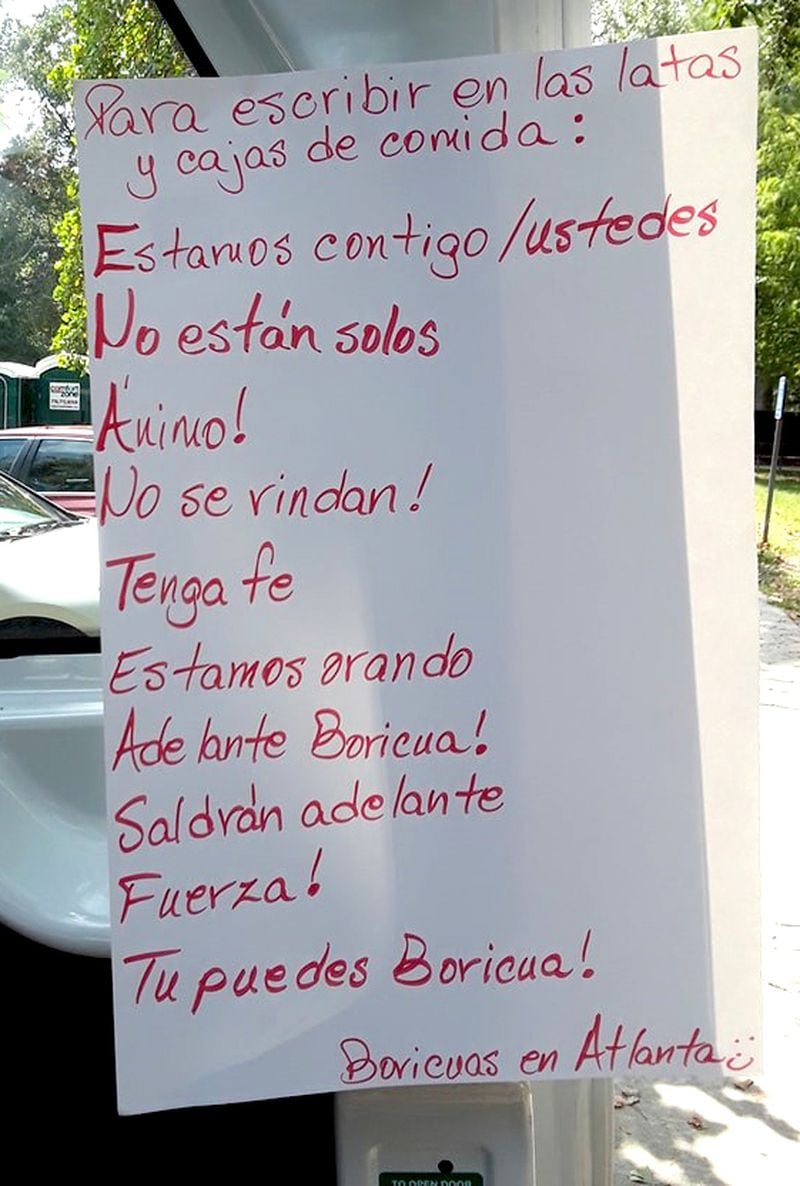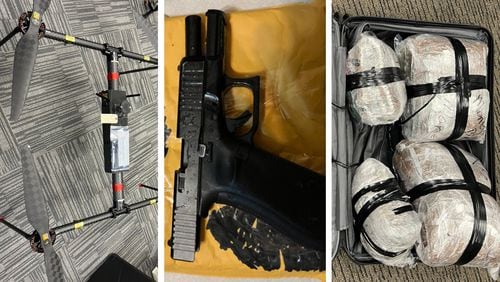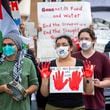As the outer bands of Hurricane Maria struck Puerto Rico, Silma Guzman of Lawrenceville talked with her father in Arecibo, on the northern coast. He said he wasn’t too worried. He hadn’t boarded up the windows of his concrete house or bought extra food and water. He figured he would ride the storm out then patch up any damage once the storm had passed.
On Thursday, eight days after Maria, Guzman had not heard another word from her father. She also hadn’t heard from her aunt, her cousins or a niece.
All it takes is one glance at the Facebook feed of any Puerto Rican outside the island to feel what Guzman is feeling; hundreds of messages and posts show uncertainty, worry, no information on whether loved ones are safe. “Does anyone know anything about Sabana Grande?” “Any news about San Sebastián?” “Can someone tell me where to call in Aguadilla?” “I haven’t heard from my grandfather since the storm hit and I’m desperate.”
Meanwhile, their worry is tinged with anger over the growing belief that the federal government has been slow to respond to the catastrophe.
“We’re part of the United States,” Guzman said. “It’s not like it’s another country. We should be treated like any other state.”
The Trump administration insisted on Thursday it was doing all that could be done for Puerto Rico. It said 10,000 U.S. troops and federal relief workers are on the island, according to the New York Times. White House Press Secretary Sarah Huckabee Sanders told Puerto Rico residents: “We will not let you down.”
The Times quoted a police officer in the city of Ponce as saying: “With all the needs there are, we go out every day to the streets and are face-to-face with the people — you don’t see a single government agency.”
Similar messages appear on Facebook hourly.
“Day 8 and this does not improve,” said one post on Thursday. “The heat is wild, the (garbage) in the streets is intolerable, people seem crazy looking for gasoline, diesel, water, ice and other items. We were among the less affected and we are still struggling to survive and keep on standing. May God help us!”
Florida Democratic Sen. Bill Nelson tweeted that frustration Thursday morning:
Media reports and social media posts say there are long lines for basic necessities such as fuel and water. People were standing in line all night to get ice. On Thursday a huge line snaked around a wharf in San Juan as evacuees waited to board a cruise ship.
‘They’re OK, for now’
For Puerto Ricans living in metro Atlanta, like Silma Guzman, the past week has been a mix of worry, frustration and relief efforts.
Three days after the hurricane struck, Johanna LoTempio still had not heard from her extended family in Cabo Rojo on the southwest end of the island. LoTempio, who works at Georgia Tech’s Research Institute, finally got word on Saturday from a ham radio operator that everyone was fine in Cabo Rojo. Her grandmother’s house was damaged when a neighbor’s roof blew off and crashed into her terrace.
By Sunday phone service had been restored, but by Monday it was out again. For a while, the family had water, but then their pumps stopped working.
“They have canned food and they’re OK, for now,” said LoTempio.
She said she was glad the Trump administration on Thursday waived the Jones Act — a century-old federal law that requires that American-owned and -operated ships, but not foreign-flagged ships, carry goods from one U.S. port to another. But she, too, thinks the relief and rescue response has been too slow.
“The logistical support should have been put in place sooner,” she said.
»Trying to reach your loved ones in Puerto Rico? Who to call, email
Generators, but no fuel
Several local relief efforts have sprung up in and around Atlanta, but most face the same problem: how to deliver water, clothing and other donations to the island?
The nonprofit Ser Familia, for example, is hard at work on relief efforts.
“We’re accepting donations through our website, Serfamilia.org,” said Belisa Urbina, director of Ser Familia. “We’re earmarking 100 percent of that money to help smaller organizations and those towns which were most impacted by the hurricane. We’re focusing our efforts on a group that manages four nursing homes, Hermanitas de Ancianos Desamparados. They are homes dedicated to caring for elderly individuals who don’t have anyone. For us the most important thing is that help get to the island.”
Marilu Suarez has been helping to coordinate a donation campaign at Georgia Tech, where she is an administrative assistant.
She’s from San Juan, and though her relatives are fine, her husband’s family in the Dorado area have experienced flooding and blown-out windows. And like the majority of the island, they are struggling through intense heat. They have generators but lack the fuel to run them.
“I have my friends who have no gas and their cellphones have poor connections,” Suarez said.
She said she has heard stories from those on the island that FEMA workers are requiring union workers at the ports to follow FEMA protocols for unloading and distributing aid, but the workers believe the situation is too dire to mess with red tape.
“The unions are saying, ‘No, this is a crisis and we have to get the supplies to the people,’” Suarez said.
For now, Suarez said, all they can do is gather what they can and try to send word to loved ones that help is on the way. They just don’t know when it will get there.
»Stories from the aftermath of Hurricane Maria in Puerto Rico
‘I don’t think he cares’
Guzman, the Lawrenceville woman who has yet to speak with her father back home, said her dad’s town is flood-prone already, and she worries that his home was damaged or destroyed.
Then a glimmer of hope, a tiny piece of information.
A friend of Guzman’s reached her own father in the same town. The friend asked about Guzman’s father and was told that he was seen at a gas station after the storm, waiting in line for fuel. But there was no more information than that.
Guzman joined many "Boricuas" — a common term for Puerto Ricans, particularly those living on the mainland — in expressing concern about the federal relief campaign. And she said she didn't hold out much hope for President Trump's scheduled visit to the island next week.
“I really think that he just doesn’t care about Puerto Rico,” Guzman said. “I really don’t think he cares.”
In Washington, however, acting Homeland Security Secretary Elaine Duke declared that “the relief effort is under control,” the Associated Press reported.
“It is really a good news story, in terms of our ability to reach people,” she told reporters in the White House driveway, the AP said.
Items needed in Puerto Rico
- Diapers
- Toilet paper
- Batteries (all sizes)
- Personal hygiene supplies (soap, toothpaste and other basics)
- Cold and diarrhea medicine (for both adult and children)
- Canned food
- Baby food
- Oatmeal
- Disinfectant wipes
- Hand sanitizer
- Insect repellent (non-aerosol)
- Paper plates along with plastic utensils
- Bottled water
